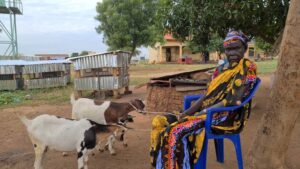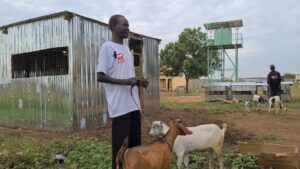
One of the beneficiaries receives chicken|Photo credit -Charles Wote|09-05-2024
Dozens of lepers and vulnerable families in Juba have received improved breeds of poultry birds and goats to improve the quality of their lives and enhance their livelihoods, thanks to Alliance for Action Aid, a Germany funded national none-governmental organization.
The support was provided by the Alliance for Action Aid – AFAA, a South Sudanese-run NGO in partnership with the German Leprosy and Tuberculosis Relief Association – GLR.
“We targeted them because they are the most vulnerable people, they are the people who have been affected and it look like they have been isolated.” Michael Gatluak, the Executive Director of Alliance for Action Aid told Eye Radio on Tuesday, May 7th 2024.
The 1,560 beneficiaries comprised of people affected by leprosy and other forms of disability received goats, chickens, farming tools as well as skills in Village Savings and Loan Associations and small businesses.
This includes 260 households of people affected by leprosy and 48 households of people with other forms of disabilities and their families.
Gatluak says majority of people affected by leprosy in Luri Rokwe of Juba County do not have access to the basic needs and have been forgotten.
“They are living without support from anyone and when we do the survey, and the verification, we realized that they are people who are in need and they have been forgotten, they have been living here in the town and no one is supporting them.” He said.
The Alliance for Action Aid has so far empowered 65 households in farming activities and trained them on best farming practices.
The vulnerable group has also received improved seeds such as maize, groundnut and vegetable seeds like tomatoes, onion, okra, eggplant, among others.
This is in addition to agricultural inputs like hand hoes with handles, garden rakes with metallic handles, pickaxes, pangas, wheelbarrows and the watering cans.
Equipment and machinery such as walking tractors and grinding machines for groundnuts were also distributed.
After extensive three-day training on livestock production and management, the charity supported another 65 households with goats, each receiving 2 female and 1 male goat.
The 143 goats were de-wormed and screened against conditions such as caprine arthritis encephalitis, caseous lymphadenitis, and bacterial pneumonia before being distributed to the beneficiaries.
However, the intervention also supported 65 households in poultry production with 520 improved poultry birds of the Kroilers type for both meat and egg production.
It is part of a one-year project to enhance livelihoods and strengthen the resilience and recovery targeting people affected by leprosy and other disabilities in Luri Rokwe boma of Juba County.
Michael Gatluak says each household beneficiary received 8 poultry birds including feed finishers, equipment such as feeders, drinkers, drugs, and a poultry house.
He, however, is appealing to well-wishers to intervene and support the people affected by leprosy to enable them become self-reliant.
“This is something we need to appeal to well-wishers and to the international donors to give them skills to be able to sustain themselves but if you give them this project and then you leave them, they will go back to square one but it needs developmental programs that can also train them slowly until when they will be able to stand by their own.” Gatluak said.
“This project is for one year, in this one year it has done a lot for them in fact it has a great impact to them but if there is any donor that can support them also as well and then given them another three or four years, you know after four years later, they will be able to work by themselves but if you leave them half way like this it will create more vulnerability.” He stressed.
Leprosy survivors welcome livelihood intervention


The Alliance for Action Aid has described the situation of the people affected by leprosy in Luri Rokwe of Juba County as dire.
Michael Gatluak, the organization’s Executive Director says “their situation is dire; they are humanitarian affected people,” he said.
“They don’t have food, nothing that is why we came up to do something that can sustain their lives.”
“We have to support them in terms of businesses, we have to support them in terms of giving them animals and then we support them in terms of giving them poultry and we trained them and we trained them on how to use them and also so that it become part of their resilient and part of their lives.”
“In case of anything, they have to take something to the market so that they will be able to help themselves.”
The Association of People Affected by Leprosy – APAL, estimate that there are over 350 vulnerable people affected by leprosy in Luri Rokwe of Juba County alone.
Majority of whom are among those that were isolated at Luri Rokwe Leprosy centre during the colonial era as well as during the former Sudanese government between 1940s and 1970s.
The association reported that the majority of the affected people are living with limited access to basic services and are depending on relatives and goodwill people for their survival.
Ebelina Poni, a bereaved mother of six, is among the people affected by leprosy who received three goats from the Alliance for Action Aid in January this year.
Welcoming the support, Poni says once produced, she will sell the goats to change her diet and address other basic needs, including paying the school fees for her nieces and nephews she is taking care of.
“The organization has helped us already and I am very happy with this type of support.” Poni told Eye Radio during the interview.
“I don’t have any other problem again only the issue of hunger which we are going to talk about it later for them to look into. However, if you receive something like this you will surely be happy because it will feed you and will provide to you every thing that you want like for me, I am very happy for receiving these goats.”
“Receiving the goats has brought for me happiness, the goats are going to help me with food and it will also help my nephews to school,” the elderly woman added.
Meanwhile, Celerina Denya a mother of six from Luri Rokwe is another beneficiary who received 8 chickens on behalf of her paralyzed son, Lawrence Swaka, on Tuesday.
She said the chickens will help her provide for her paralysed son, including addressing his personal needs.
“I am going to take care of these chickens and if they produce, it is going to help Lawrence Swaka with food, with soap and medication in case if he is sick.”
“I will also sell if it produces, I will take some and sell to help him. If they also produce eggs, I will cook for him as well.”
The widow in her 40s said she will exhaust all her efforts to ensure that the poultry are taken care of to enable them to produce and enhance her livelihood.
For his part, the Chairperson of the Association of the people affected by Leprosy commended the Alliance for Action Aid and the German Leprosy and Tuberculosis Relief Association for the livelihood initiative.
Joseph Wani Cirilo said among the support include agricultural inputs, poultry distribution, and livestock.
“We are very happy, yes, we are very happy with German Leprosy and Tuberculosis Relief Association and AFAA who are the implementers. We are very happy for their initiative to distribute chickens to us today.”
“This is the third support to us, the first one was goats’ distribution, the second one was the agricultural inputs and today is the chicken distributions.”
“We are very happy so we welcome wholeheartedly, this is the best thing and we are very happy.” Wani added.
At an early age, Lawrence Modi, a resident of Luri Rokwe, said he contracted leprosy and was put under medication for four years.
Despite undergoing treatment, the 40-year-old father of two experienced body deformities that left him losing his fingers and toes.
He is among the over 1000 vulnerable people who received livestock support to improve their living standards.
Modi said “since last year, they gave us food which helped us a lot throughout December.”
“It included the 50kg of flour, 5 liters of cooking oil and beans are some of the food items they gave us. As you can see, these are also the goats they gave me and today they are distributing chickens so they are work is going on well.”
“For those of us who know the importance of goats, these they are very important because if taken care of you will not suffer. If you are hungry or there is something you want or build your own house, you will sell some and that is why I am very happy.”
Founded by a group of South Sudanese in 2016, the Alliance for Action Aid works to address numerous challenges facing South Sudanese communities including alleviating poverty and diseases.
The charity is also working to provide support to the most vulnerable families to bring sustainable socioeconomic empowerment in different parts of South Sudan.
Support Eye Radio, the first independent radio broadcaster of news, information & entertainment in South Sudan.
Make a monthly or a one off contribution.
Copyright 2024. All rights reserved. Eye Radio is a product of Eye Media Limited.